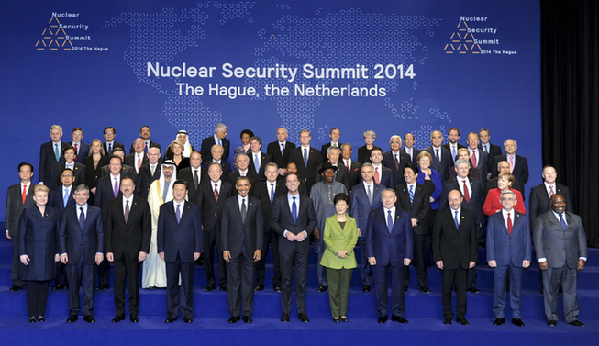Summit communique addresses nuclear terrorism
 0 Comment(s)
0 Comment(s) Print
Print E-mail Xinhua, March 26, 2014
E-mail Xinhua, March 26, 2014
|
|
|
Chinese President Xi Jinping (4th L, front) poses for a group photo during the third Nuclear Security Summit in The Hague, the Netherlands, March 25, 2014. [Xinhua] |
This is the third such event after the first NSS was held in Washington in 2010 and the second one was held in Seoul in 2012. A total of 58 world leaders have participated in the two-day event to seek ways to boost nuclear security around the globe.
The themes of this year's summit is to reduce the amount of dangerous nuclear material in the world, improve security of all nuclear material and radioactive sources, and step up international cooperation.
Addressing a closing press conference together with U.S. President Barack Obama, who will chair the next NSS in Washington in 2016, Dutch Prime Minister Mark Rutte said world leaders at the summit "have taken a big step" in making the world safer by preventing nuclear terrorism.
Obama hailed the progress that has been made in The Hague summit. "It was not about commitment but about concrete steps to make sure nuclear material does not fall into the hands of terrorists. That's what we have done," he said.
The final communique of the NSS 2014 represented a major step forward and a fitting follow-up to the agreements made at earlier summits in Washington and Seoul.
Leaders at the summit reaffirmed the fundamental responsibility of countries "to maintain at all times effective security" of all nuclear and other radioactive materials, including nuclear materials used in nuclear weapons, and nuclear facilities under their control, according to the communique.
The document urged countries to take appropriate measures to prevent non-state actors from obtaining such materials, emphasizing the importance of "robust national legislation and regulations" on nuclear security.
"We emphasize the need to further strengthen and coordinate international cooperation in the field of nuclear security," added the communique.
Countries, regulatory bodies, research and technical support organizations, the nuclear industry and other relevant stakeholders, are encouraged to build "a strong security culture" and "share good practices and lessons," it said.
The 36-point document said that highly enriched uranium (HEU) and separated plutonium require "special precautions," and that it is of great importance that "they are appropriately secured, consolidated and accounted for."
It noted that over the past four years, a considerable amount of HEU has been down-blended to low-enriched uranium (LEU) and separated plutonium converted to mixed oxide (MOX) fuel.
"We encourage States to minimize their stocks of HEU and to keep their stockpile of separated plutonium to the minimum level, both as consistent with national requirements," read the communique.
Countries are encouraged to continue to minimize the use of HEU through the conversion of reactor fuel from HEU to LEU, where technically and economically feasible. The document welcomes cooperation on technologies facilitating such conversion.
The communique also stressed the importance of the security of information related to nuclear material and technology, including information held on computer systems.
It urged countries and the private sector to take effective measures to ensure that the systems and networks of nuclear facilities are appropriately secured, in order to address the growing threat of cyber attacks facing the world.







Go to Forum >>0 Comment(s)